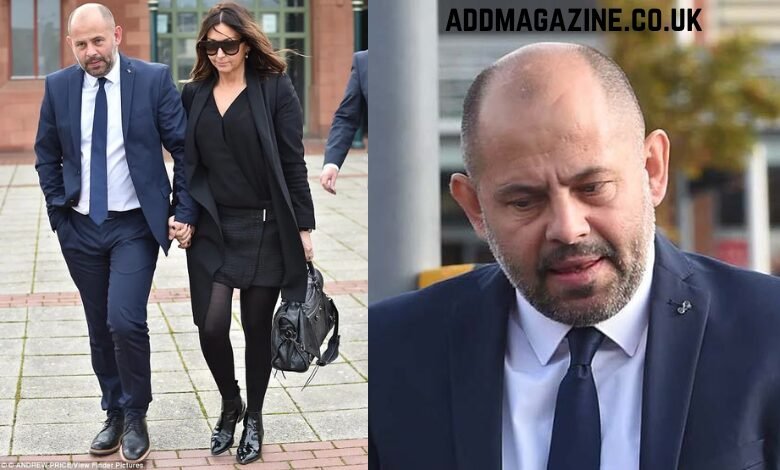Tom Cairney, the Fulham FC captain, is not a name that often pops up in tabloid gossip. The 34-year-old footballer has built a reputation as an intelligent and composed midfielder, one whose influence on the pitch is often more understated than flashy. However, despite his calm demeanor and years of professional experience, Cairney recently found himself in the headlines for a far less glamorous reason: a fine from the DVLA (Driver and Vehicle Licensing Agency) related to an expired car tax.
The story of how Cairney found himself in trouble with the law due to a car tax oversight is one of those situations that could happen to anyone, regardless of their fame or status. In fact, it sheds light on how easy it can be for ordinary individuals to make a seemingly minor mistake that ends up resulting in substantial consequences.
The Fine: How It All Began
The fine stemmed from Cairney’s failure to pay his vehicle tax on time, a mistake that ended up costing him much more than the tax itself. According to reports, the DVLA discovered that Cairney’s Audi had expired tax as of September 19 of the previous year. The footballer failed to pay the renewal fee of £2.92. It seems like a small amount for a professional athlete with a substantial income, but as we all know, government agencies do not often show leniency in such matters.
Cairney’s mistake was detected by the DVLA on October 26, over a month after his car tax had expired. While the £2.92 tax fee itself was negligible, the penalties for not renewing the tax were anything but. Upon entering a guilty plea, Cairney admitted that he had simply forgotten to pay the tax. He wrote a letter to the court stating that he took full responsibility for the lapse and clarified that his car was now fully insured.
Cairney’s admission of guilt was clear, but his fine—amounting to £7,692—was the result of the offence. This sum is not the actual cost of the expired tax but the penalty imposed by the magistrate in Derby. Given that the maximum penalty for failing to pay car tax can be up to £1,000, this fine raised eyebrows. The DVLA was apparently empowered to apply higher penalties, taking into account the fact that Cairney was a high-profile individual and possibly the public nature of his mistake.
Why Was the Fine So High?
For a small oversight like not paying £2.92 in car tax, the resulting fine of £7,692 seems extreme. This disproportionate penalty has led to some questions about whether the Single Justice Procedure, a fast-track court process used to handle such offences, is fair. Under this procedure, magistrates make decisions behind closed doors, often without the public seeing the reasoning behind their decisions. This lack of transparency can sometimes lead to controversial outcomes.
In Cairney’s case, the magistrate imposed a fine well above the usual range, sparking debates over whether such large fines are appropriate for minor offences. The Single Justice Procedure, in particular, has faced criticism in the past. A review by the Magistrates Association in March of the previous year noted concerns about the way these fast-track procedures function, with some suggesting reforms to ensure fairer penalties, including the requirement for magistrates to explain why they impose penalties outside the usual guidelines.
The review followed a number of high-profile cases where fines were seen as unusually severe. In a similar case, a City worker was hit with a £40,000 fine for forgetting to pay £50 in car tax. There was also the case of Watford footballer Tom Dele-Bashiru, who was fined nearly £6,000 for failing to tax his car for over a year. These cases, like Cairney’s, are examples of how small, unintentional mistakes can result in serious financial consequences.
A Common Mistake
Despite the high-profile nature of Cairney’s case, his mistake is far from unique. Many people, especially those who have a busy schedule or a number of other responsibilities, forget about renewing their vehicle tax. The DVLA does send out reminders, but it’s easy for those reminders to be overlooked, especially in the midst of a hectic life.
The DVLA’s enforcement of expired car tax is robust, and its system is designed to automatically detect unlicensed vehicles. While the £2.92 tax fee may seem trivial, the agency is empowered to issue fines that can far exceed the amount owed in tax. This reflects the seriousness with which the government treats road tax, even in cases where the amount at stake is small.
Interestingly, this isn’t the first time Tom Cairney has found himself in the news for matters unrelated to his football career. Back in 2020, he was accused of parking his Lamborghini in a disabled parking space while stopping for a coffee. While this incident did not lead to a fine or criminal conviction, it did add to the narrative of Cairney being involved in car-related mishaps. In 2022, former Fulham striker Aleksandar Mitrovic accidentally smashed Cairney’s car windscreen during a training session. The following year, another player, Rodrigo Muniz, repeated the mishap, showing that Cairney may just have a bit of bad luck when it comes to cars.
The Bigger Picture: The Impact of Vehicle Tax and the System Behind It
Tom Cairney’s experience is an unfortunate example of how important it is to stay on top of vehicle tax renewals, as well as the sometimes punitive measures that follow when individuals fail to do so. The DVLA is an organization tasked with managing the vehicle licensing system in the UK, ensuring that drivers pay their taxes and adhere to the rules of the road. Vehicle tax, in particular, is crucial because it contributes to maintaining public roads and ensuring that vehicles are legally insured for use on the road.
For those who forget to pay, the consequences can be severe. As seen in Cairney’s case, failing to renew tax for just over a month can result in hefty fines, even if the amount owed is only a few pounds. This serves as a reminder that, regardless of one’s profession or status, certain responsibilities cannot be overlooked, and in cases where they are, the penalties can be severe.
The DVLA’s automated systems are designed to make it easier for people to pay their tax on time, but these systems are also unforgiving. Once a vehicle’s tax has expired, it’s flagged by the DVLA, and penalties can be imposed without much room for negotiation. While some might argue that this is a reasonable and efficient way to enforce road tax regulations, others see it as overly harsh for minor mistakes.
What’s Next for Tom Cairney?
As of now, Tom Cairney has been given a criminal conviction for the offence. While he is now fully compliant with his vehicle tax and insurance, his legal troubles over the expired tax remain a part of his record. The fine he was handed, along with the public nature of the case, might have an impact on his public image, even though it’s clear that the mistake was unintentional.
Interestingly, Cairney is not the only footballer who has faced issues with car tax. As mentioned earlier, Watford’s Tom Dele-Bashiru also made headlines for failing to tax his car for more than a year. However, unlike Cairney, Dele-Bashiru did not face a criminal conviction. This difference in outcomes has raised further questions about the fairness of the penalty system for individuals in the public eye.
At the end of the day, Cairney’s case is an unfortunate but valuable reminder for everyone to stay on top of their responsibilities, no matter how trivial they may seem. Whether you’re a professional athlete or an ordinary citizen, overlooking small details like vehicle tax can lead to unexpectedly large consequences. In Cairney’s case, the fine might be large, but it is a lesson that everyone can learn from.
Conclusion
Tom Cairney’s DVLA fine highlights how easily mistakes can turn into major financial issues, especially when they involve government enforcement. While the fine he received might seem excessive for an offence involving just a few pounds, it serves as a reminder to take responsibility for small tasks like renewing car tax. It also raises questions about the fairness and transparency of the Single Justice Procedure, which has been criticized for imposing harsh penalties without sufficient explanation. For Cairney, it’s a costly lesson in ensuring that even the smallest of details are not overlooked.
FAQs
. Why was Tom Cairney fined by the DVLA?
Tom Cairney was fined for failing to pay his car tax on time. His Audi’s tax expired in September 2023, and the DVLA detected the unpaid tax in October, resulting in a fine of £7,692.
2. How much tax did Cairney owe when his car was unlicensed?
Cairney owed just £2.92 in car tax for a period of over a month, but the DVLA’s penalties far exceeded this amount due to the offence.
3. What is the Single Justice Procedure?
The Single Justice Procedure is a fast-track court process where magistrates handle cases behind closed doors, typically for minor offences like missed vehicle tax payments, without a public hearing.
4. Was Cairney’s fine disproportionate to the offence?
Many believe Cairney’s fine was excessive, considering the small amount of tax owed. The fine was much higher than the maximum £1,000 penalty typically imposed for such offences.
5. Has Tom Cairney faced any other car-related issues?
Yes, Cairney has had a few car-related incidents in the past, including being accused of parking in a disabled space and having his windscreen accidentally damaged twice by Fulham teammates.




